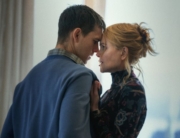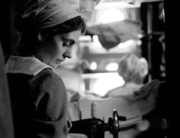Parallels between The Order and the United States’ current political crises are hard to miss, especially in the wake of the recent presidential election. The growing threat of radicalized militias, coupled with the indoctrination of young men who fear a threatening “other,” looms large in this 1980s-era story. What’s most shocking about The Order isn’t so much its historical details as how lost to time this true story has become, even as its parallels underscore the idiom of history repeating itself.
Australian filmmaker Justin Kurzel’s crime thriller gets under your skin because of its criminals’ motives. Originally stationed in rural Idaho, the fictional FBI agent Terry Husk (Jude Law) is brought to Washington State to investigate an armed robbery that initially seems like an isolated incident. However, upon partnering with local cop Jamie Bowen (Tye Sheridan), Husk learns that an old acquaintance of Bowen’s has gone missing while working with the suspects—White supremacists whose ambitions extend beyond robberies, counterfeiting, and terrorist bombings. Their extremism is so audacious that even their neo-Nazi peers find them excessive.
This splinter group calls itself the Order, led by the young and charismatic Robert Jay Matthews (Nicholas Hoult). An aspiring movement leader, Matthews is inconspicuous enough to slip under people’s radars but cunning enough to devise a strategy for growing and funding his operations. He oversees the heists and bombings while recruiting new members into the Order’s cause, preying on their fears. From there, The Order becomes a slow-burn game of cat and mouse, with Husk, his FBI team, and the Washington police force working to uncover Matthews’s activities and map out his wider goal of starting a race war.
Unlike his mentor, Richard Butler (Victor Slezak)—a troublingly folksy preacher for the Aryan Nation—Matthews rejects a slow and steady approach to infiltrating American politics. Plenty of stories depict younger generations pushing back against their elders’ teachings, but it’s unsettling to see this dynamic from a White supremacist’s perspective. The tension crescendos when an emboldened Matthews delivers a White power speech to rally the congregation’s younger members to his cause. The script takes its time delving into Matthews’s relationships with his wife and young son, providing insight into his warped motives. This is a man who teaches his son to fire an Uzi and reads the incendiary The Turner Diaries as a bedtime story—effectively indoctrinating the next generation to view hatred as normal and even necessary.
Compared to Hoult’s youthful fanatic, Law’s portrayal of Husk is that of a world-weary enforcer confronting an ideology that, even with his history of bringing criminals to justice, feels almost inhuman. Sporting a thick mustache, pent-up family grief, and a habit of rushing into conflicts—much to the chagrin of his fellow agent Joanne (Jurnee Smollett)—Husk is at once driven and exhausted. Law captures Husk’s fury and fatigue, even as the occasionally heavy-handed dialogue questions whether he’s still capable of playing the game.
While Husk anchors the film, his colleagues Jamie (Sheridan) and Joanne (Smollett) remain largely supporting characters, their roles confined to archetypal duties. One notable exception is Marc Maron’s cameo as radio host Alan Berg. His broadcasts and tragic fate synthesize the movie’s anti-hate thesis in a way that lingers long after the credits roll.
The Order frequently returns to the theme of malevolence disguised as benign. Adam Arkapaw’s cinematography alternates between breathtaking shots of the Canadian Rocky Mountains (standing in for the Pacific Northwest) and fast-paced, gritty shootouts or car chases that emphasize the Order’s violent nature. Much of the violence ties back to The Turner Diaries, the infamous 1978 neo-Nazi dystopian novel that inspired the Order’s name and extremist tactics. For Husk and his team, the book becomes a chilling cipher for understanding Matthews’s race war ambitions.
As the credits point out, The Turner Diaries has served as a manual for countless acts of terrorism and White nationalist indoctrination, from the 1995 Oklahoma City bombing to the January 6 U.S. Capitol riot. The Order is frightening because it positions itself as an exploration of contemporary White nationalism in its infancy. Come for the thrilling procedural, and leave with the uncomfortable realization that echoes of this story are unfolding in the world today.

















Leave A Comment